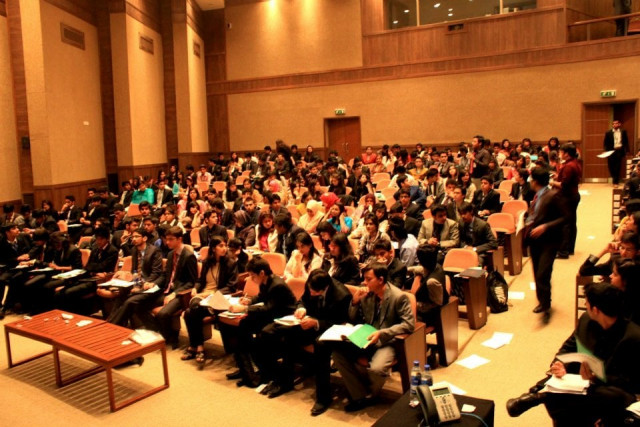MUNIK 2013: Debaters converge at IBA to resolve global woes
Delegates from Hong Kong, the Netherlands and Germany also part of the four-day moot.

A file photo of MUNIK 2012. PHOTO: MUNIK FACEBOOK PAGE
“We have delegates from across the age spectrum. They include a student of grade seven, as well as several others who are pursuing graduation,” said Sidra Azam, a member of the IBA Public Speaking Society, who was handling media and publication resources for the four-day conference.
These students are set to sit in on several meetings where they will debate on various current affairs challenges, and draft resolutions.
International participation
Several of the delegates had travelled to Karachi to take part in the moot. They included Hong Kong’s Coleman Tse, who was heading the United Nations Commissioner for Refugees, and Mary Lam, who was put in charge of the World Trade Organisation. The Netherlands’ Sam Klopper had been put in charge of the UN Conference on Sustainable Development and Francijna van Alphen was heading the Arab League committee. Russia’s Anastasia Trubnikova was heading the United Nations Entity for Gender Equality and the Empowerment of Women, and Germany’s Florian Gruenwald was put in charge of the International Atomic Energy Agency. Participants were divided into a total of 18 UN committees and organisations, including the all-important United Nations Security Council.

Weapons proliferation
Delegates assigned to the UN Committee for Disarmament and International Security were all ears for Dr Bilal Munshi as he lambasted global economic superpowers for encouraging other nations to pursue strategic disarmament, while they themselves engaged in weapons proliferation at the same time.
While the number of global arms suppliers has gone down so that weapons supplies could be brought under control, the problem still exists and has led to the formation of a monopoly, said Dr Munshi, who is an assistant professor of international relations at the National Defence University Islamabad.
Francijna van Alphen, who was chairing the Arab League committee, said that she expected her delegates to provide rich material for issues like the ongoing conflict in Syria.
Published in The Express Tribune, January 21st, 2013.



















COMMENTS
Comments are moderated and generally will be posted if they are on-topic and not abusive.
For more information, please see our Comments FAQ